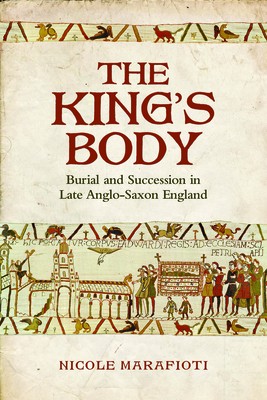
- We will send in 10–14 business days.
- Author: Nicole Marafioti
- Publisher: University of Toronto Press
- ISBN-10: 1442647582
- ISBN-13: 9781442647589
- Format: 16.3 x 23.6 x 2.5 cm, hardcover
- Language: English
- SAVE -10% with code: EXTRA
Reviews
Description
The King's Body investigates the role of royal bodies, funerals, and graves in English succession debates from the death of Alfred the Great in 899 through the Norman Conquest in 1066. Using contemporary texts and archaeological evidence, Nicole Marafioti reconstructs the political activity that accompanied kings' burials, to demonstrate that royal bodies were potent political objects which could be used to provide legitimacy to the next generation.
In most cases, new rulers celebrated their predecessor's memory and honored his corpse to emphasize continuity and strengthen their claims to the throne. Those who rose by conquest or regicide, in contrast, often desecrated the bodies of deposed royalty or relegated them to anonymous graves in attempts to brand their predecessors as tyrants unworthy of ruling a Christian nation. By delegitimizing the previous ruler, they justified their own accession. At a time when hereditary succession was not guaranteed and few accessions went unchallenged, the king's body was a commodity that royal candidates fought to control.
EXTRA 10 % discount with code: EXTRA
The promotion ends in 10d.15:06:26
The discount code is valid when purchasing from 10 €. Discounts do not stack.
- Author: Nicole Marafioti
- Publisher: University of Toronto Press
- ISBN-10: 1442647582
- ISBN-13: 9781442647589
- Format: 16.3 x 23.6 x 2.5 cm, hardcover
- Language: English English
The King's Body investigates the role of royal bodies, funerals, and graves in English succession debates from the death of Alfred the Great in 899 through the Norman Conquest in 1066. Using contemporary texts and archaeological evidence, Nicole Marafioti reconstructs the political activity that accompanied kings' burials, to demonstrate that royal bodies were potent political objects which could be used to provide legitimacy to the next generation.
In most cases, new rulers celebrated their predecessor's memory and honored his corpse to emphasize continuity and strengthen their claims to the throne. Those who rose by conquest or regicide, in contrast, often desecrated the bodies of deposed royalty or relegated them to anonymous graves in attempts to brand their predecessors as tyrants unworthy of ruling a Christian nation. By delegitimizing the previous ruler, they justified their own accession. At a time when hereditary succession was not guaranteed and few accessions went unchallenged, the king's body was a commodity that royal candidates fought to control.


Reviews